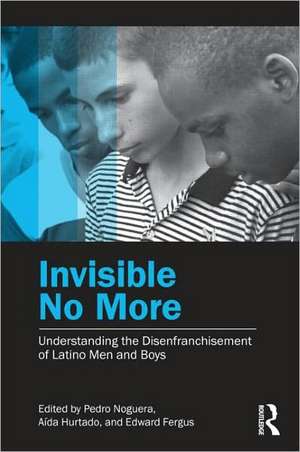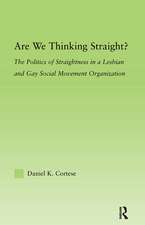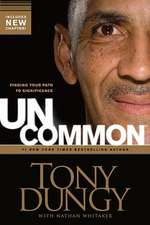Invisible No More: Understanding the Disenfranchisement of Latino Men and Boys
Editat de Pedro Noguera, Aída Hurtado, Edward Fergusen Limba Engleză Paperback – 29 aug 2011
This groundbreaking interdisciplinary volume, edited by renowned scholars Pedro Noguera, Aída Hurtado and Edward Fergus addresses the dearth of scholarship and information about Latino men and boys to further our understanding of the unique challenges and obstacles that they confront during this historical moment. The contributors represent a cross section of disciplines from health, criminal justice, education, literature, psychology, economics, labor, sociology and more. By drawing attention to the sweeping issues facing this segment of the population, this volume offers research and policy a set of principles and overarching guidelines for decreasing the invisibility and thus the disenfranchisement of Latino men and boys.
| Toate formatele și edițiile | Preț | Express |
|---|---|---|
| Paperback (1) | 443.98 lei 6-8 săpt. | |
| Taylor & Francis – 29 aug 2011 | 443.98 lei 6-8 săpt. | |
| Hardback (1) | 1120.55 lei 6-8 săpt. | |
| Taylor & Francis – 29 aug 2011 | 1120.55 lei 6-8 săpt. |
Preț: 443.98 lei
Preț vechi: 522.33 lei
-15% Nou
Puncte Express: 666
Preț estimativ în valută:
84.97€ • 88.47$ • 71.81£
84.97€ • 88.47$ • 71.81£
Carte tipărită la comandă
Livrare economică 11-25 martie
Preluare comenzi: 021 569.72.76
Specificații
ISBN-13: 9780415877794
ISBN-10: 0415877792
Pagini: 336
Ilustrații: 20 tables and 13 line drawings
Dimensiuni: 152 x 229 x 23 mm
Greutate: 0.46 kg
Ediția:1
Editura: Taylor & Francis
Colecția Routledge
Locul publicării:Oxford, United Kingdom
ISBN-10: 0415877792
Pagini: 336
Ilustrații: 20 tables and 13 line drawings
Dimensiuni: 152 x 229 x 23 mm
Greutate: 0.46 kg
Ediția:1
Editura: Taylor & Francis
Colecția Routledge
Locul publicării:Oxford, United Kingdom
Cuprins
Introduction
1. Invisible No More: The Status and Experience of Latino Males from Multidisciplinary Perspectives Pedro Noguera, Aída Hurtado
Section 1: The State of Latino Males
2. Social Mobility and the Complex Status of Latino Males: Education, Employment, and Incarceration Patterns from 2000-2009, Mellie Torres, Edward Fergus
3. Adolescent Mexican American Males: No Increased Risk of Mental Health Problems, Robert E. Roberts, Catherine Ramsay Roberts
4. Reducing Sexual and Reproductive Health Disparities Among Latino Men: Exploring Solutions in the Boundaries of Masculinity, Miguel Muñoz-Laboy, Ashley Perrry
5. Searching for Ideal Masculinity: Negotiating Day Labor Work and Life at the Margins, Abel Valenzuela, Jr., Maria C. Olivares Pasillas
Section 2: Masculinity Construction
6. "Where the Boys Are": Macro and Micro Considerations for the Study of Young Latino Men’s Educational Achievement, Aída Hurtado, Craig Haney, Jose G. Hurtado
7. Taking Count of Gender and Legal Status Within Latino Media Policy, Dolores Inés-Casillas
8. Anchoring the Measurement of Machismo and Latino Male Identity in Contemporary Definition and Theory, Maria Félix-Ortiz, Ian Ankney, Megan Brodie, Harold Rodinsky
9. Transforming Boys, Transforming Masculinity, Transforming Culture: Masculinity Anew in Latino and Latina Children’s Literature, Phillip Serrato
10. Undocumented Latino Youth: Strategies for Accessing Higher Education, Daysi Diaz-Strong, Christina Gómez, María E. Luna-Duarte, Erica R. Meiners
11. Claiming Queer Cultural Citizenship: Gay Latino (Im)migrant Acts in San Francisco, Horacio N. Roque Ramirez
Section 3: Race, Gender, and Skin Color in Constructing Identification
12. Does Race and National Origin Influence the Hourly Wages That Latino Males Receive? Clara E. Rodríguez, Grigoris Argeros, Michal H. Miyawaki
13. The Relevance of Skin Color in the Construction of an Ethnic Identification Among Mexican and Puerto Rican Boys, Edward Fergus
14. Racially Stigmatized Masculinities and Empowerment: Conceptualizing and Nurturing Latino Males’ Schooling in the United States, Nancy López
15. "Sometimes You Need to Spill Your Heart Out to Somebody": Close Friendships Among Latino Adolescent Boys, Niobe Way, Carlos Santos, Alexandra Cordero
Section 4: Environmental Factors and Violence
16. Street Socialization and the Psychosocial Moratorium, James Diego Vigil
17. Latino Male Violence in the United States, Ramiro Martinez, Jr., Jacob I. Stowell
Conclusion
18. What We Have Learned: The Role of Public Policy in Promoting Macro and Micro Levels of Intervention in Response to the Challenges Confronting Latino Men, Pedro Noguera, Aída Hurtado, Edward Fergus
Contributor Biographies
Index
1. Invisible No More: The Status and Experience of Latino Males from Multidisciplinary Perspectives Pedro Noguera, Aída Hurtado
Section 1: The State of Latino Males
2. Social Mobility and the Complex Status of Latino Males: Education, Employment, and Incarceration Patterns from 2000-2009, Mellie Torres, Edward Fergus
3. Adolescent Mexican American Males: No Increased Risk of Mental Health Problems, Robert E. Roberts, Catherine Ramsay Roberts
4. Reducing Sexual and Reproductive Health Disparities Among Latino Men: Exploring Solutions in the Boundaries of Masculinity, Miguel Muñoz-Laboy, Ashley Perrry
5. Searching for Ideal Masculinity: Negotiating Day Labor Work and Life at the Margins, Abel Valenzuela, Jr., Maria C. Olivares Pasillas
Section 2: Masculinity Construction
6. "Where the Boys Are": Macro and Micro Considerations for the Study of Young Latino Men’s Educational Achievement, Aída Hurtado, Craig Haney, Jose G. Hurtado
7. Taking Count of Gender and Legal Status Within Latino Media Policy, Dolores Inés-Casillas
8. Anchoring the Measurement of Machismo and Latino Male Identity in Contemporary Definition and Theory, Maria Félix-Ortiz, Ian Ankney, Megan Brodie, Harold Rodinsky
9. Transforming Boys, Transforming Masculinity, Transforming Culture: Masculinity Anew in Latino and Latina Children’s Literature, Phillip Serrato
10. Undocumented Latino Youth: Strategies for Accessing Higher Education, Daysi Diaz-Strong, Christina Gómez, María E. Luna-Duarte, Erica R. Meiners
11. Claiming Queer Cultural Citizenship: Gay Latino (Im)migrant Acts in San Francisco, Horacio N. Roque Ramirez
Section 3: Race, Gender, and Skin Color in Constructing Identification
12. Does Race and National Origin Influence the Hourly Wages That Latino Males Receive? Clara E. Rodríguez, Grigoris Argeros, Michal H. Miyawaki
13. The Relevance of Skin Color in the Construction of an Ethnic Identification Among Mexican and Puerto Rican Boys, Edward Fergus
14. Racially Stigmatized Masculinities and Empowerment: Conceptualizing and Nurturing Latino Males’ Schooling in the United States, Nancy López
15. "Sometimes You Need to Spill Your Heart Out to Somebody": Close Friendships Among Latino Adolescent Boys, Niobe Way, Carlos Santos, Alexandra Cordero
Section 4: Environmental Factors and Violence
16. Street Socialization and the Psychosocial Moratorium, James Diego Vigil
17. Latino Male Violence in the United States, Ramiro Martinez, Jr., Jacob I. Stowell
Conclusion
18. What We Have Learned: The Role of Public Policy in Promoting Macro and Micro Levels of Intervention in Response to the Challenges Confronting Latino Men, Pedro Noguera, Aída Hurtado, Edward Fergus
Contributor Biographies
Index
Notă biografică
Pedro Noguera is Peter L. Agnew Professor of Education in the Steinhardt School of Culture, Education, and Human Development at New York University.
Aída Hurtado is Professor and Luis Leal Endowed Chair in the Chicana and Chicano Studies Department at University of California, Santa Barbara.
Edward A. Fergus is Deputy Director of the Metropolitan Center for Urban Education at New York University.
Aída Hurtado is Professor and Luis Leal Endowed Chair in the Chicana and Chicano Studies Department at University of California, Santa Barbara.
Edward A. Fergus is Deputy Director of the Metropolitan Center for Urban Education at New York University.
Descriere
This groundbreaking interdisciplinary volume addresses the dearth of scholarship and information about Latino men and boys to further our understanding of the unique challenges and obstacles that they confront during this historical moment.














